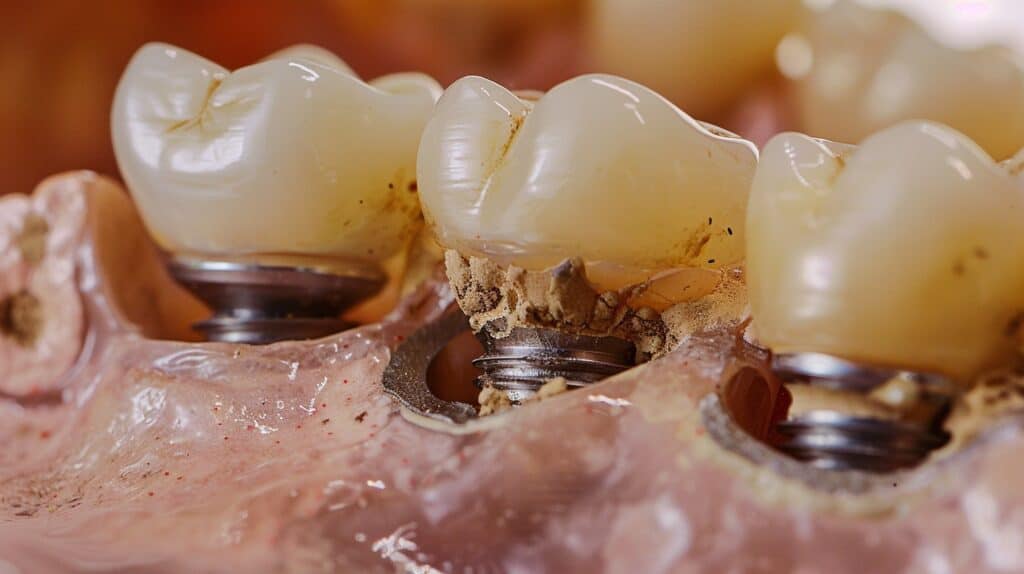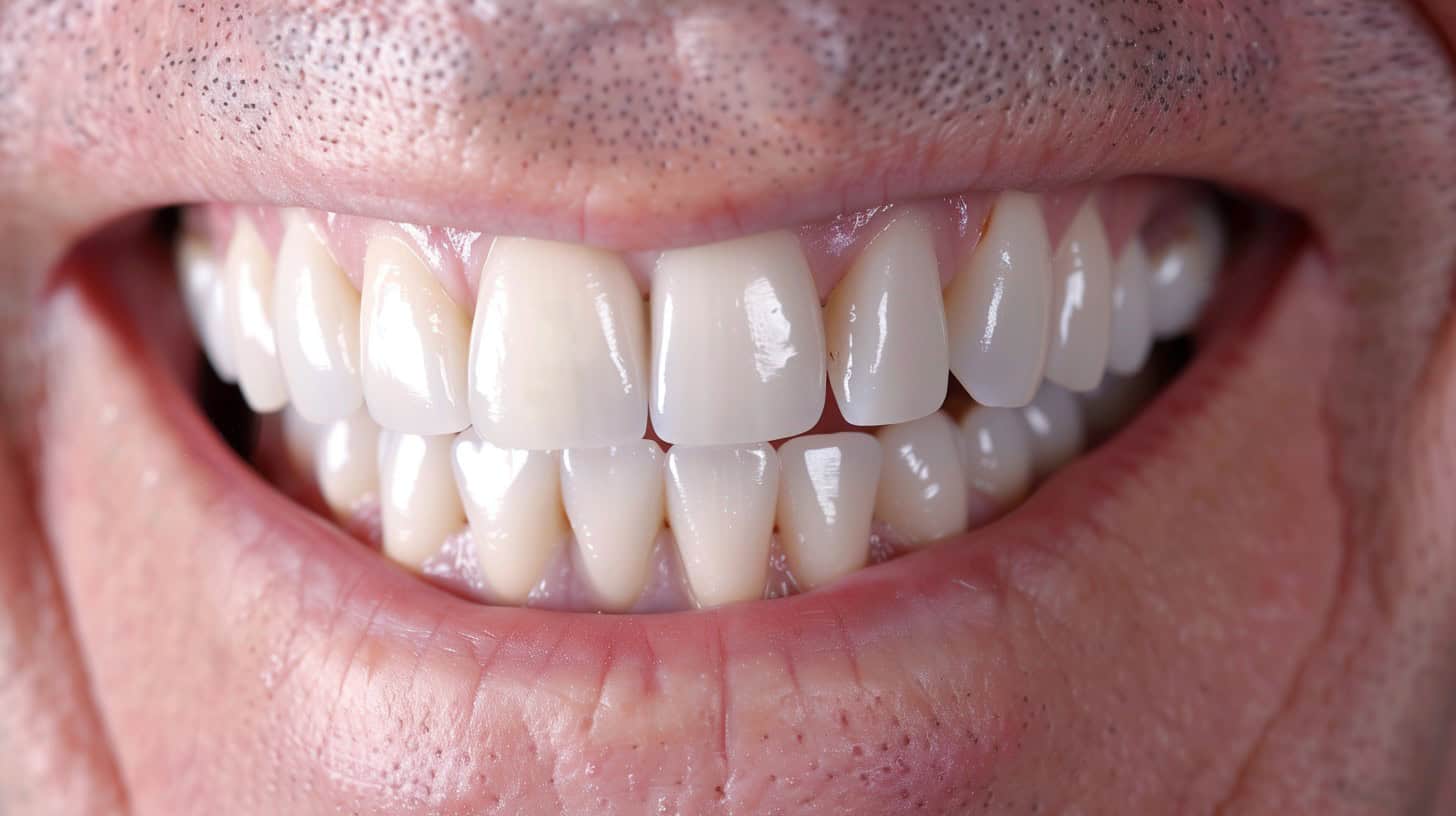Dental implants can last a lifetime with proper care. 1 But their longevity depends on several factors. The success rate of dental implants is 90% to 95% over 10+ years. 1 This makes them a reliable option for tooth replacement.
Yet, many patients wonder about the lifespan of their implants.
As a dental surgeon with 15 years of experience, I’ve seen the impact of various factors on implant durability. Oral hygiene, implant material, and bone quality play crucial roles. 3 This article will explore these factors and provide tips for extending implant life. Ready to learn how to make your dental implants last? Let’s start.
Key Takeaways
Dental implants can last 20+ years or even a lifetime with proper care, with success rates of 90-95% over 10+ years.
The implant screw often lasts a lifetime, while the crown typically needs replacement after 10-15 years due to normal wear.
Factors affecting implant longevity include oral hygiene, implant material (titanium or ceramic), bone quality, and overall health.
Common reasons for implant failure include poor oral hygiene, bruxism, allergic reactions, and insufficient jawbone density.
Remedies for implant issues include removal and replacement, bone grafting, antibiotics, and improved hygiene routines.
Table of Contents
Typical Life Expectancy of Dental Implants

Dental implants boast impressive longevity. According to Vip Dental Care clinic, these artificial teeth can last 20+ years with proper care. 2 The implant screw itself often lasts a lifetime, while the attached crown typically needs replacement after 10-15 years due to normal wear.
Implant success rates reach 90-95% over a decade, outperforming many other dental prosthetics. 1
Dental implants in Forest Hills, NY offer a durable, long-term solution for tooth loss.
Factors like oral hygiene, bone quality, and overall health impact implant lifespan. 1 Regular check-ups and good dental habits maximize durability. Some patients resume normal activities just 3 days post-surgery, though full osseointegration takes months.
With diligent care, these tooth replacements can serve you well for decades.
Elements Affecting Implant Durability

Several factors influence how long dental implants last. Your oral hygiene routine and the quality of your jawbone play big roles in implant success.
Maintaining Oral Hygiene
Oral hygiene is crucial for dental implant longevity. Men must brush twice daily, floss, and limit sugary foods. Regular dental check-ups every 6 months are essential. Proper care prevents peri-implantitis, a condition affecting 9.4% of implants at 2-3 years. 3 Implants can’t get cavities but are vulnerable to gum disease.
Good oral health practices include using the right toothbrush, toothpaste, and mouthwash. Plaque and tartar build-up around implants can lead to bone loss and implant failure. Men should quit smoking to improve implant success rates. 4 Ongoing periodontal therapy may be necessary for long-term implant care. CBCT scans help dentists monitor bone density and implant stability.
Implant Material Types
After maintaining good oral hygiene, the material of your dental implant plays a crucial role in its longevity. Titanium and ceramic are the most common biocompatible materials used for implants.
Titanium has been the gold standard for decades due to its strength and durability. Ceramic implants, often made of zirconia, offer a metal-free alternative with comparable success rates. 5
Zirconia implants have shown a 10-15 year lifespan with proper care, rivaling traditional titanium options.
Quality matters – higher-grade materials typically last longer. Your dentist can help you choose the best implant type for your specific needs, considering factors like allergies, aesthetics, and bone density. 6 Remember, regardless of material, good oral care remains essential for implant success.
Bone Quality and Density
Bone quality and density directly impact dental implant success. Strong, dense jawbones provide a solid foundation for implants. X-rays and 3D modeling assess bone health before surgery.
Type III bone in the mandibular posterior region poses challenges. Implants longer than 11.5 mm show better results. 4 Baseline bone level starts at 0.09 ± 0.28 mm. Over 8-10 years, mean bone level changes to 0.49 ± 0.74 mm.
This gradual bone loss can affect implant stability.
Insufficient bone mass often leads to implant failure. Smaller or wider diameter implants face higher risks. Optimal implant length contributes to long-term success. Bone grafting or sinus lifting might be necessary for some patients.
These procedures boost bone volume, creating a sturdy base for the artificial tooth root. Regular check-ups help monitor bone health and catch potential issues early. 5
Overall Health Impact
Your overall health plays a crucial role in dental implant success. Uncontrolled diabetes increases implant failure rates significantly. 3 Patients with weakened immune systems, bleeding disorders, or cardiovascular issues face higher risks.
Osteoporosis and autoimmune diseases like lupus or rheumatoid arthritis can complicate the healing process. Smokers experience an 11% failure rate compared to 5% in non-smokers.
Certain medications impact implant durability. Blood thinners and immunosuppressive drugs can interfere with healing. Cancer treatments, particularly radiation therapy to the jaw area, may compromise bone density.
Age also factors in – older adults often have slower healing and underlying conditions that affect implant success. 4 Maintaining good oral hygiene and overall wellness through a balanced diet and regular dental check-ups boosts implant longevity.
Tackling Implant Failures

Implant failures happen, but they’re not the end of the road. Quick action and proper care can save your smile… and your investment.
Reasons for Implant Failure
Dental implant failure can occur due to various factors. Here’s a breakdown of common reasons:
- Insufficient Care: Poor oral hygiene leads to peri-implantitis, causing bone loss around the implant. 8
- Bruxism: Teeth grinding puts excessive pressure on implants, potentially causing fractures or loosening.
- Allergic Reactions: Some patients may react to implant materials, typically titanium or nickel.
- Nerve Damage: Improper placement can result in pain, numbness, or tingling in surrounding areas.
- Implant Shifting: Lack of osseointegration causes the implant to move, affecting stability.
- Inexperienced Surgeon: Errors during placement increase the risk of complications and failure.
- Poor Impressions: Inaccurate molds lead to ill-fitting crowns and potential implant issues.
- Medical Conditions: Diseases like diabetes or autoimmune disorders can impair healing and osseointegration.
- Insufficient Jawbone Density: Lack of bone support compromises implant stability and longevity.
- Trauma During Surgery: Excessive force or heat during placement damages surrounding tissues. 7
- Overloading: Premature or excessive pressure on new implants disrupts the healing process.
- Smoking: Tobacco use restricts blood flow, impeding healing and increasing infection risk.
Remedies for Implant Issues
Addressing implant failure promptly can prevent further complications. Here are effective remedies for implant issues:
- Remove and replace: Surgeons may extract the failed implant and insert a new one. This often involves bone grafts to strengthen the jaw. 7
- Bone grafting: If bone loss occurs, grafting procedures can rebuild the foundation for a new implant. Materials like synthetic bone or your own bone may be used.
- Antibiotics: Infections around implants can be treated with targeted antibiotic therapy. This helps eliminate harmful bacteria and promote healing.
- Occlusal adjustments: Dentists can modify your bite to reduce stress on implants. This prevents excessive force that may lead to implant loosening.
- Hygiene improvements: Enhanced cleaning routines, including special brushes and floss, can address peri-implantitis. Regular dental cleanings are crucial.
- Soft tissue grafts: Gum recession around implants can be corrected with tissue grafts. This improves aesthetics and protects the implant structure.
- Switch to alternatives: In some cases, dental bridges or removable dentures may be better options. Your prosthodontist can recommend suitable replacements.
- Treat underlying conditions: Managing systemic issues like diabetes or autoimmune conditions can improve implant success rates. Consult your doctor for proper care. 8
People Also Ask
How long do dental implants typically last?
Dental implants can last 20-30 years… or even a lifetime. Proper dental hygiene, regular check-ups, and avoiding habits like smoking are key.
What factors affect the lifespan of tooth implants?
Oral health, bone density, implant placement, lifestyle choices (smoking, diet), and overall health impact implant longevity. Periodontal disease, tooth grinding, and poor dental care can shorten their life.
Can dental implant failures be prevented?
Yes! Regular brushing, flossing, dental appointments, and a healthy diet help. Avoid grinding teeth, quit smoking, and address any gum issues promptly to prevent implant failure.
Are there risks associated with dental implant surgery?
Risks include infection, nerve damage, sinus problems… but they’re rare. Discuss concerns with your dentist or oral surgeon. They’ll review your medical history, including allergies and medications.
How does oral health affect implant success?
Good oral hygiene is crucial. Brush twice daily, floss regularly, use mouthwash. Poor oral health leads to gum disease, tooth decay – major threats to implant stability and longevity.
What’s the recovery process like after getting dental implants?
Initial healing takes 1-2 weeks. Expect some discomfort, swelling. Soft foods, careful brushing around the site. Full integration (osteointegration) can take 3-6 months. Follow your dentist’s instructions closely.
References
- ^ https://garylogin.com/how-long-do-dental-implants-last/
- ^ https://www.ncbi.nlm.nih.gov/pmc/articles/PMC10982840/
- ^ https://www.ncbi.nlm.nih.gov/pmc/articles/PMC8359846/
- ^ https://www.ncbi.nlm.nih.gov/pmc/articles/PMC5774056/
- ^ https://blyssdental.com/how-long-do-dental-implants-last-5-lifespan-factors-and-tips/ (2022-11-15)
- ^ https://hannadentalimplants.com/how-long-do-dental-implants-last/
- ^ https://www.ncbi.nlm.nih.gov/pmc/articles/PMC4327689/
- ^ https://www.ncbi.nlm.nih.gov/pmc/articles/PMC9674049/




